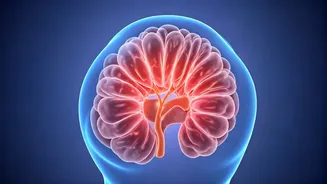Facial and Belly Fat
Increased cortisol can trigger weight gain, especially in the face and abdomen. This hormone signals the body to store fat, primarily around the midsection.
The body believes it’s under threat when cortisol is high, and this causes it to hoard energy to prepare for a perceived emergency. The accumulation of fat isn't just a cosmetic issue; it's linked to an increased risk of health problems. Addressing this involves lifestyle adjustments, such as managing stress through relaxation techniques, consuming a balanced diet, and engaging in regular exercise. Cutting back on processed foods, sugary drinks, and excess carbs can also assist in maintaining healthy cortisol levels, and overall wellness.
Accelerated Aging Issues
High cortisol levels accelerate the aging process, particularly affecting the skin. It can break down collagen, leading to wrinkles and a loss of elasticity. Cortisol also interferes with the skin's ability to repair itself. Skin problems and a premature aged look can be attributed to chronically high cortisol. To combat these effects, it's beneficial to adopt practices that reduce stress. Incorporating a consistent skincare routine can also help. Focus on products that support collagen production and protect the skin from environmental stressors. Additionally, getting enough sleep is crucial for the body's repair processes and helps keep cortisol levels in check.
Muscle Loss & Posture
Elevated cortisol can cause muscle wasting and alterations in posture. As a catabolic hormone, cortisol breaks down muscle tissue to provide the body with energy during times of stress. This muscle breakdown can lead to postural changes as the body tries to compensate for the loss of muscle strength. Muscle wasting can result in changes in body shape. Regular resistance training is highly recommended to counteract muscle loss. Prioritizing protein intake is essential for muscle repair and growth, especially after exercise. If you are experiencing postural issues or body shape changes, this can be an indicator that your body needs attention, which can be accomplished by focusing on your diet and exercise habits.
Hair Thinning and Growth
High cortisol can negatively impact hair health, leading to thinning and slow hair growth. Chronic stress can disrupt the hair growth cycle, causing hair follicles to enter a resting phase prematurely. This can result in increased hair shedding and decreased hair density. Stress management strategies, such as yoga, meditation, and deep breathing exercises, are useful. Also, a nutrient-rich diet with essential vitamins and minerals is helpful. Ensuring you get adequate sleep is also vital because this facilitates hair growth and overall well-being. By taking the right steps, you can help reverse these effects and promote healthier hair.














